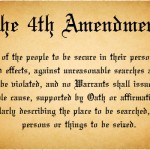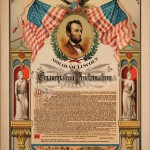The Twentieth Amendment to the US Constitution Explaining the need for the Twentieth Amendment is messy. That is because despite the care taken in drafting, the Constitution left a few matters messy. The Constitution provided terms of office for House members, Senators and the President. It did not give dates for when those terms would begin. It left […]
Fourth Amendment Victory: Cell Phones Cannot be Searched Without a Warrant
In an age of NSA surveillance, secret courts issuing secret warrants, IRS officials allowing private data to be made public and more, it is important to take notice when the Supreme Court steps up and unanimously limits government intrusions in line with the intent of the Founders. Applying 18th Century constitutional commands in the modern […]
The Exclusionary Rule in US Criminal Trials
Part of the Bill of Rights, the Fourth Amendment to the United States Constitution prohibits government searches or seizures without a warrant issued by a disinterested magistrate. The Fourth Amendment protects the right to have government stay out of a person’s home and property without prior approval by a judge. If the judge has found […]
Fifteenth Amendment: Power to Congress over Voting Discrimination
The Civil War had been won by the North, but there was still much to do, as both legal and extra-legal means were used to prevent freed slaves from voting. Between the end of the Civil War in 1865 and 1870, the US Constitution was amended three times. The Thirteenth, Fourteenth and Fifteenth Amendments are collectively known as […]
US Constitution’s Twelfth Amendment: Correcting a Founding Error
The Founders’ recognition of human failings drove creation of many constitutional institutions. Powers were separated and sovereignty divided to protect against human tendencies to accumulate power. Most institutions were designed with the flaws of humanity in mind. The Founders ignored these considerations of human nature in some instances and the results were mistakes. Among the mistakes was the system […]
US Constitution’s Twenty-Seventh Amendment: 202 Years in the Making
The First Freedom of the First Amendment is the Freedom of Religion. The Right to Bear Arms is famously in the Second Amendment. The American Bill of Rights has an almost majestic quality by being composed of ten amendments, recalling the structure of the Ten Commandments. But the 1789 Congress submitted twelve amendments drafted by […]
US Constitution’s Thirteenth Amendment: Legal Abolition of Slavery
Abraham Lincoln issued The Emancipation Proclamation on January 1, 1863 freeing many slaves. Its scope was limited and its true legality unclear. Lincoln had freed the slaves in areas of rebellion with an executive order. His constitutional authority to do this was in question. For slavery to be abolished with certainty in the United States, a constitutional amendment was […]
The Constitution’s Sixteenth Amendment: Result of Political Miscalculation
When April 15th rolls around as they labor toward the filing deadline for income taxes, Americans would be forgiven if they were to become nostalgic about Patrick Henry’s opposition to the Stamp Act of 1765 and his call for the death of the King[1] because of a required government stamp on most documents in the […]
The Fifth Amendment Guarantee Against Double Jeopardy
The US Constitution‘s Fifth Amendment requires government procedures to protect the natural, inalienable rights of life, liberty and the pursuit of happiness recognized in the Declaration of Independence. Among these protections is a limit on multiple prosecutions based upon the same alleged conduct. This limitation is commonly referred to as a protection from “double jeopardy”. The Double […]
The Fifth Amendment’s Grand Jury: A Proud & Lost Protection of Liberty
The Fifth Amendment of the Bill of Rights mandates government procedures to protect the natural, inalienable rights of life, liberty and the pursuit of happiness recognized in the Declaration of Independence. The amendment contains five protections for these natural rights. The Fifth Amendment’s first protection requires the federal government to use a grand jury to […]















